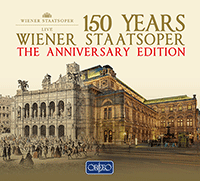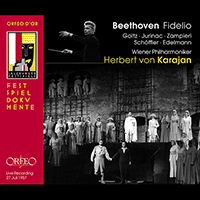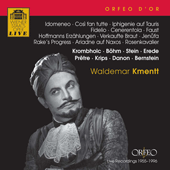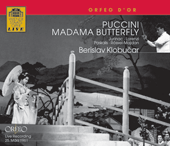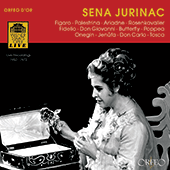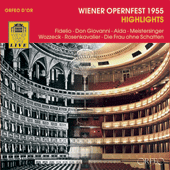Sena Jurinac
Sena Jurinac was born Srebrenka Jurinac: her father, a doctor, was Croatian and her mother Viennese. Having studied at the Zagreb Academy of Music and with Milka Kostrenčić, who also taught Zinka Milanov, she made her operatic stage debut at Zagreb nine days before her twenty-first birthday, as Mimì / La Bohème. During the following two years she sang the Countess / Le nozze di Figaro, Freia / Das Rheingold, in the premiere of the revised version of Werner Egk’s radio opera Columbus and in various Yugoslav operas.
In 1943 Jurinac was awarded a scholarship to study at Anna von Mildenburg’s summer course at the Salzburg Mozarteum and the following year was contracted by the Vienna State Opera. Here Karl Böhm’s secretary, believing that the pronunciation of her first name Srebrenka would be problematic for Austrians, suggested that she shorten it to Sena. Three days after her arrival at the Vienna State Opera the city and opera house came under heavy Allied bombardment and her debut
with the company was delayed until May Day 1945, when a performance of Le nozze di Figaro was mounted under Josef Krips for the Russian occupying army, with Jurinac as Cherubino.
When this company appeared at the Royal Opera House, London in 1947, Jurinac sang Dorabella / Così fan tutte and was promptly engaged by the Glyndebourne Festival Opera to sing the same role under Vittorio Gui at the 1948 Edinburgh Festival. The following year she sang Dorabella at Glyndebourne itself, before moving up to Fiordiligi for the 1950 Festival. Later roles at Glyndebourne included the Countess, Ilia / Idomeneo and Donna Anna / Don Giovanni, sung in her final season there in 1956.
Back in Austria the Salzburg Festival was also quick to engage Jurinac: as Dorabella (1947), Cherubino and Cupid / Orfeo ed Eurydice (1948) and Marzelline / Fidelio (1953). She was encouraged by Herbert von Karajan to explore the Italian repertoire with him at the Vienna State Opera: she sang Desdemona / Otello there in 1957 and Butterfly / Madama Butterfly in 1958, followed by Elisabetta / Don Carlo at the Salzburg Festival (1958, 1960) and Poppea / L’incoronazione di Poppea in Vienna (1963). Also at Salzburg she sang Eurydice / Orfeo ed Eurydice (1959), Octavian / Der Rosenkavalier (1960, 1963 and 1964), the Countess (1962), the Composer / Ariadne auf Naxos (1964) and Marina / Boris Godunov (1965–1967), as well as giving numerous concerts.
From the early 1950s onwards Jurinac appeared often in Italy: at the Maggio Musicale, Florence as Lisa / The Queen of Spades (1952); at La Scala, Milan as Octavian (1952), Cherubino (1954), Butterfly and Eurydice (1958), Suor Angelica (the title role, 1959), the Countess (1960, 1967), and Elisabeth / Tannhäuser (1967); and at the Rome Opera House as Pamina / Die Zauberflöte and Lisa (1956).
Fritz Busch asked Jurinac to sing some of the earliest performances of Richard Strauss’s Vier letzte Lieder, with him conducting, in Scandinavia in 1951; and at the Bayreuth Festival she appeared in 1957 as Eva / Die Meistersinger von Nürnberg.
At the Royal Opera House, London Jurinac sang Butterfly, Leonore / Fidelio (under Klemperer, 1961) and Donna Elvira / Don Giovanni (1962). Having sung Octavian there in 1959, she graduated to the Marschallin / Der Rosenkavalier under Solti in the Visconti production of 1966. Later roles included the title parts in Tosca (1968) and Iphigenie en Tauride (1973). Her American operatic appearances included Butterfly at San Fancisco (1959) and Desdemona at Chicago (1963).
Among Jurinac’s later roles were Elisabeth / Tannhäuser, the Kostelnička / Jenůfa, Leonora / La forza del destino and Marie / Wozzeck. Her farewell performance at Vienna came in 1982, as the Marschallin, after which she retired to Augsburg with her second husband (the first having been the baritone Sesto Bruscantini) where she often gave master-classes.
During her career Jurinac’s voice developed from one of simple purity to a mesmerising force, reflecting her move up the hierarchy of soprano operatic roles. She was a central member of the fabulous post-war ensemble of the Vienna State Opera, which she served with great distinction, being appointed an honorary member in 1968.
© Naxos Rights International Ltd. — David Patmore (A–Z of Singers, Naxos 8.558097-100).








